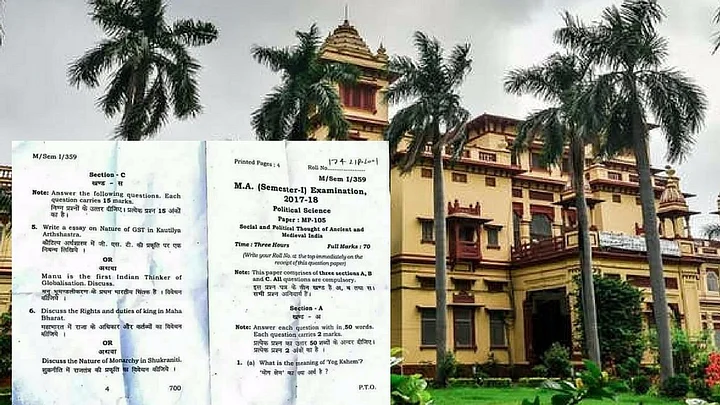Kautilya’s Arthashastra, an ancient Indian text on statecraft, economic policy and military strategy, is considered an important text in the study of political science in the country. However, what possible answer could someone have if asked about nature of "GST" in Arthashastra? Confused? Well it doesn’t end here.
Manusmriti, another ancient text on the social structure of the country, would not have have a link to globalisation, right?
Well, we could argue about this all we want, but these absurd connections found a place in the MA (Political Science) exam paper at the Banaras Hindu University's semester examination.
Sample these:
- Write an essay on the nature of GST in Kautilya's Arthashastra
- Manu is the first Indian thinker of globalisation. Discuss
These were the 15-mark questions asked in the Social and Political thought in Ancient and Medieval India paper for MA in Political Science in BHU.
Even as students expressed outrage about the fact that such questions were not part of the subject’s syllabus, Professor Kaushal Kishore Mishra, who set up the question paper, told The Indian Express that he had “interpreted the two thinkers and taught their philosophies through new and current examples like GST and globalisation”.
It was my idea to introduce these examples to students. So what if these are not in the textbook? Isn’t it our job to find newer ways to teach.Kaushal Kishore Mishra, Professor, talking to The Indian Express
But students from colleges affiliated to the University said they were not taught the answers to the said questions and they were not part of the syllabus as well.
Sir had dictated the answers, and specifically told us that we would get these questions. They are not part of our textbooks, but we took down notes.A student to The Indian Express
“These ridiculous and unpalatable questions in our paper are really disheartening. We are being taught these fictitious concepts just to validate the policies of the present government. Even in 2016, we were taught the benefits of demonetisation, and that characters in Ramayana had used surgical strikes to defeat enemies. However, we were not tested on them after we objected,” a student told The Indian Express.
According to professor Mishra, however, the ancient texts allude to current socio-economic policies.
“Kautilya’s Arthashastra is the first Indian book which hints at the current concept of GST. The concept of GST primarily says that consumer gains the most. The meaning of GST suggests that the country’s finances and economy be unified and uniform. Kautilya is one such thinker who propounded national economic integration — ekikaran… In fact, Kautilya had specified in his time that taxes on house construction be 20 percent, gold and other metals 20 percent, border tax 20 percent, gardens five percent, singers, dancers and artistes 50 percent.”
He also told his students that Manu was the first thinker to have introduced the tradition of globalisation in the world.
“Evidence of Manu’s teachings on religion, language and politics is found in China, Philippines, New Zealand. In New Zealand, the word for manav or man has been borrowed from Manu,” The Indian Express quoted him as saying.
While the professor might be right on Kautilya’s vision on tax as Kautilya himself stated in Arthshastra that taxes should be "convenient to pay, easy to calculate, inexpensive to administer, equitable and non-distortive”, it’s still very far from the whole idea of GST.
On the other hand, the major focus in Manu's Manusmriti was the creation of the world and social division on the basis of classes. Manu has not talked about globalisation anywhere.
Mishra admitted that he is a member of the RSS, but claimed that his personal beliefs never interfere with what he teaches to his students.
The head of the Political Science department of BHU, RP Singh, refused to admit that the questions were out of syllabus. “It is the prerogative of the teacher to set the paper according to his area of specialisation,” he told the publication.
(With inputs from The Indian Express.)
